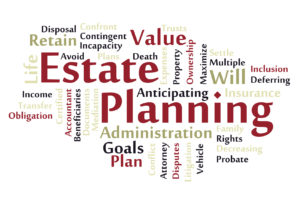No matter what your age or how much money/wealth you’ve accumulated, you need an estate plan to protect yourself, your loved ones and your assets- both now while you’re still active as well as after your death.
 Understand the essential before you plan:
Understand the essential before you plan:
- Will: A will simply provides instructions for distributing your assets to your family and other beneficiaries upon your death. Absent a will your assets will get distributed just not necessarily to whom you wish. To be effective, a will must be filed in probate court. This assures an orderly processing of transferring assets when you die. Keep in mind a will does not take effect until you die. If you become incapacitated the will does not become effective. You need the next item for that.
- Durable Power of Attorney: A power of attorney is a legal document in which you name another person to act on your behalf, for example if you become incapacitated. You can give this person broad or limited powers. You should choose this person very carefully. They will usually have the power to sell, invest and spend your assets. A durable Power of Attorney terminates upon your death.
- Health Care Power of Attorney: A durable power of attorney for health authorizes someone to make medical decisions for you in the event you are unable to do so yourself. This document along with a living will (#4) can be invaluable for avoiding family conflicts or court intervention.
- Living Well: A living will expresses your intentions regarding the use of life-sustaining measures in the event of a terminal illness. It expresses what you want but does not give anyone the authority to speak for you.
- Revocable Living Trust: This is probably the one item that you might find least important. A revocable living trust allows you to transfer assets into a trust for continued management of your financial affairs during your lifetime (even when incapacitated), at your death and even generations to come. Another benefit is you avoid probate. My biggest issue with trusts is the expense and administrative burden when in most situations the first 4 suffice for most people.
Just be sure you discuss with a professional to determine if one is really necessary.
Once you create these documents be sure to review them periodically to ensure they remain up-to-date given any significant changes (births, deaths, divorces, etc.) in your situation. If you already have these documents when was the last time you reviewed them?
Keep in mind these documents are only a part of the estate planning process. Feel free to reach out to me if you have any questions about these documents or other concerns you need to be aware of regarding estate planning.

